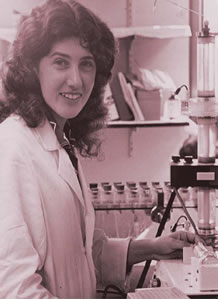 |
Sondra Schlesinger was born July 10, 1934 in New Jersey. She graduated from the University of Michigan, Ann Arbor with a bachelor’s degree in chemistry in 1956. Four years later she received her doctorate in biochemistry from the same institution. She acquired postdoctoral training in Italy (1960-61) and Massachusetts Institute of Technology (1961-64) before accepting a position as an assistant professor in what was then called the Department of Microbiology and Immunology at Washington University School of Medicine in 1964.
Schlesinger’s research interests first focused on microbial genetics. Later, she redirected her research towards understanding the structure and replication of RNA enveloped viruses, in particular the alpha virus, Sindbis. Insight gained from these studies has led to the development of vector systems for the expression of hetereologous genes. As such these systems are used worldwide for many molecular and neurobiological applications.
At Washington University School of Medicine, Schlesinger quickly advanced to Associate Professor in 1972 and became Professor of Molecular Microbiology in 1977. In 2001, she retired to become a professor emeritus.
Schlesinger’s excellence in science has been recognized by a NIH Merit Award and by many national and international editorial positions and leadership roles. In 1997, she was named a Fellow of the American Association for the Advancement of Science.
For almost 40 years, Sondra Schlesinger has contributed to the university as a teacher, investigator and administrator. As the first women to hold a faculty position in her department, she recalls primarily being ignored as she began to establish her lab. As academics woke up to the paucity of women faculty, Schlesinger found herself taking on many local and national committee responsibilities.
Highly involved in efforts to racially integrate the medical school classes, she also remembers several attempts to organize women faculty prior to the inception of the Academic Women’s Network of which she was an active member during the initial years. Deeply committed to encouraging trainees and young faculty, Schlesinger has been highly instrumental in advancing their scientific careers and goals.
Recently Schlesinger has developed a Web site on the history of structural virology. She has also devoted time and interest to bioethics, playing leadership roles in coursework, a series of lectures called Science and Society, as well as in the establishment of a comprehensive interdisciplinary Center for the Study of Human Values at Washington University.
